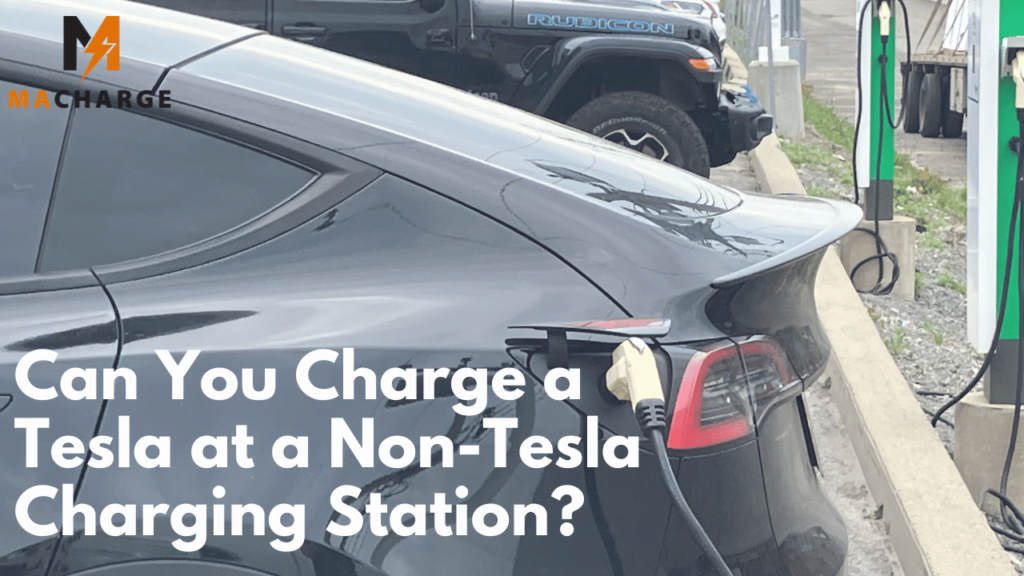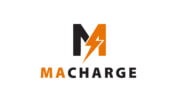
Electric vehicles (EVs) are gaining popularity and the availability of charging stations are becoming crucial. Tesla, known for its innovative EVs, has its own proprietary charging network called Tesla Superchargers. However, what happens if you own a Tesla but need to charge at a non-Tesla charging station? We will explore the possibilities and provide insights for homeowners, business owners, property management companies, and commercial landlords who are considering installing charging stations for Tesla owners but that are not Tesla Superchargers.
Can a Tesla Charge at a Regular Charging Station?
One common question among Tesla owners is whether they can charge their vehicles at a regular charging station. The answer is both yes and no. Tesla vehicles are equipped with a proprietary charging connector, the Tesla connector. To charge at a regular charging station, Tesla owners need to use an adapter. Tesla provides various adapters, including the Tesla-to-J1772 adapter, which allows Tesla vehicles to connect to Level 2 charging stations using a standard J1772 plug. The picture in this blog is a example of the adapter. This adapter makes it possible for Tesla owners to charge their vehicles at most public charging stations.
Can I Charge My Non-Tesla with a Tesla Charger?
On the flip side, owners of non-Tesla EVs often wonder if they can use Tesla Superchargers to charge their vehicles. While there have been discussions about allowing non-Tesla EVs to use Superchargers, as of now, Superchargers are exclusively for Tesla vehicles. It’s important for non-Tesla EV owners to utilize public charging networks or dedicated charging stations compatible with their vehicles. In summary, at this time, Tesla Superchargers are designed exclusively for Tesla vehicles. They utilize a unique plug that is not compatible with non-Tesla EVs, including brands such as Kias and BMWs. Non-Tesla EV owners must use charging stations compatible with their specific vehicle models. This blog will be updated as Ford and General Motors (GM) just announced agreements with Tesla so their drivers can use the Superchargers.
How to Charge a Tesla at a Public Charging Station?
To charge a Tesla at a public charging station, follow these steps:
- Check for compatibility: Ensure that the charging station is equipped with a Tesla connector or a compatible plug, such as the J1772 plug.
- Verify charging network: Confirm if the charging station belongs to a compatible charging network, such as ChargePoint, Flo, Juicebox, or Wallbox. Tesla owners can access these stations using the appropriate adapter.
- Prepare the adapter: If necessary, connect the Tesla-to-J1772 adapter to your Tesla charging cable.
- Connect and charge: Plug the adapter (if required) or the Tesla charging cable into the charging station. Follow the instructions on the charging station or associated app to initiate the charging process.
Pros and Cons
Charging a Tesla at non-Tesla charging stations has its advantages and disadvantages. Let’s explore some of the key points:
Pros:
- Increased accessibility: Using non-Tesla charging stations expands charging options, making it more convenient for Tesla owners.
- Broader network coverage: Non-Tesla charging stations are often more widespread, allowing for longer-distance travel.
- Compatibility with other EVs: Tesla owners who also own non-Tesla EVs can use the same charging stations for both vehicles.
Potential limitations of non-Tesla charging stations include:
- Inconsistent charging experience: Not all non-Tesla charging stations offer the same user experience as Tesla Superchargers. The availability, reliability, and user interface of these stations can vary, affecting the overall charging experience.
- Compatibility issues: While Tesla owners can use adapters to connect to non-Tesla charging stations, there may still be compatibility issues with certain charging stations or adapters. It is crucial to ensure the compatibility of the charging equipment to avoid any potential issues or damage.
- Charging costs: non-Tesla charging stations may have different pricing structures, which can result in varying costs per kilowatt-hour (kWh) compared to Tesla Superchargers. Tesla owners should be mindful of the charging costs associated with using non-Tesla stations.
- Limited fast-charging options: Tesla Superchargers are renowned for their fast-charging capabilities. While some non-Tesla charging stations offer fast-charging options, not all of them provide the same level of charging speed. Tesla owners may need to plan their charging stops accordingly to ensure they have access to fast-charging options when needed.
Choosing MaCharge for Electric Vehicle Installations
At MaCharge, we understand the importance of providing reliable charging solutions for Tesla owners and non-Tesla EV owners alike. As electrical contractors specializing in electric vehicle installations and energy management solutions, we offer comprehensive services to cater to your needs.
Our team of experienced electricians ensures the seamless installation of charging stations at residential, commercial, and public locations. Whether you require Tesla Superchargers, non-Tesla charging stations, or a combination of both, we tailor our services to meet your specific requirements.
With a focus on quality, safety, and customer satisfaction, MaCharge is your trusted partner for EV installations. Our expertise, combined with industry-leading products and competitive pricing, sets us apart as a reliable choice for your electric vehicle charging needs.
Contact us at www.macharge.ca to learn more about our services and how we can assist you in creating a reliable and efficient charging infrastructure.
